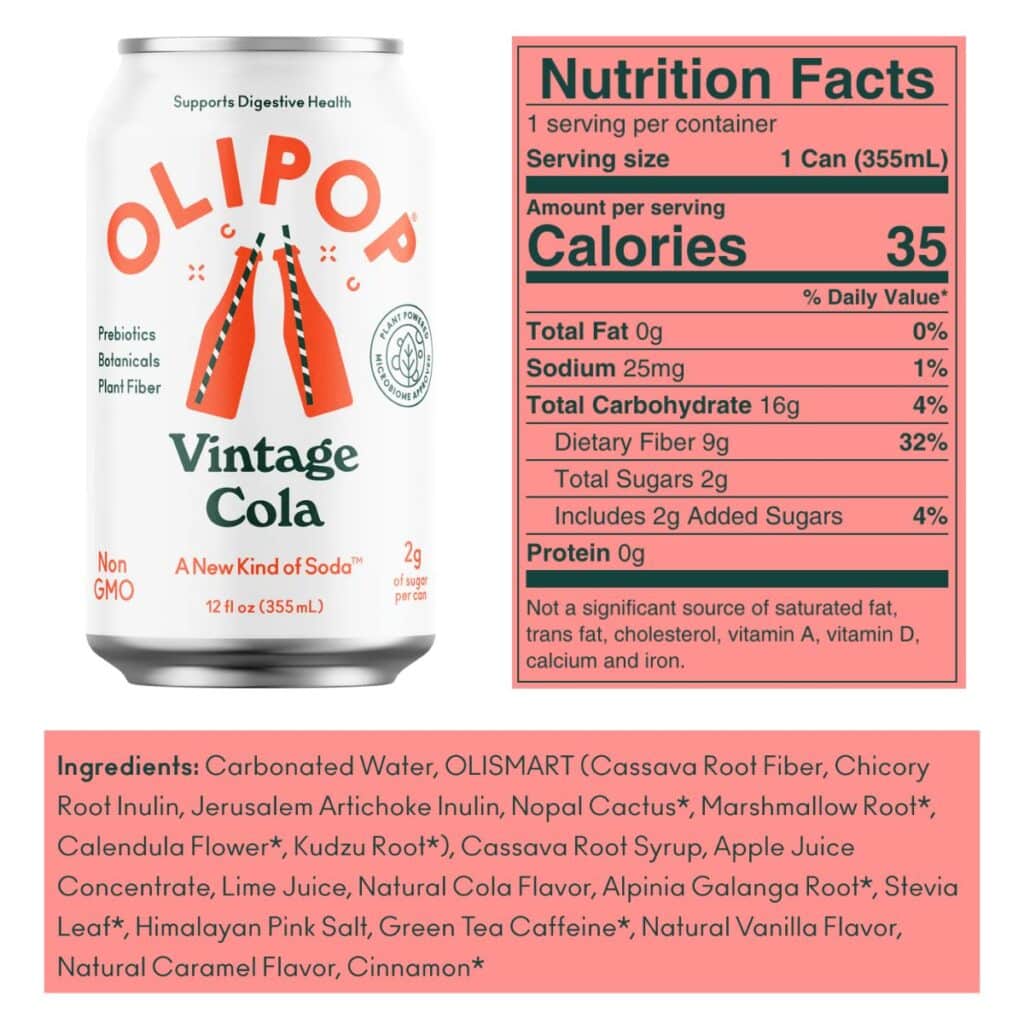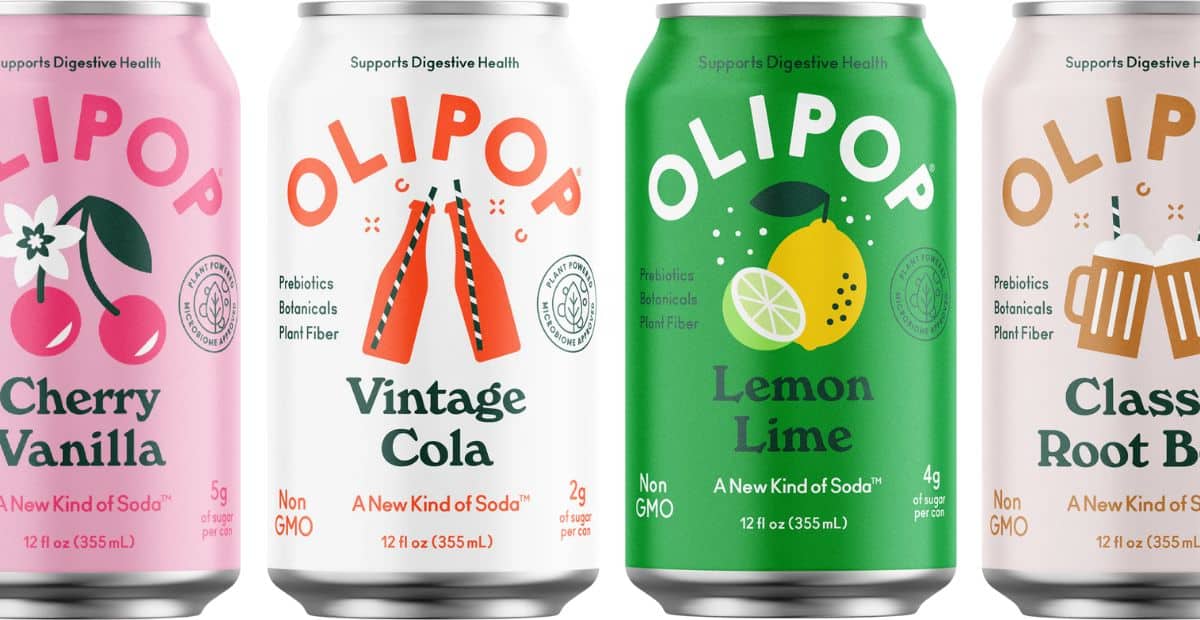Olipop is a prebiotic soda marketed as a healthier alternative to traditional soda. But is Olipop healthy for you? I break down the nutrition facts and ingredients to help you make an informed choice at the grocery store.
About Olipop
Olipop is a prebiotic soda marketed as a healthier alternative to traditional soda. It is made with “gut-friendly” ingredients, and the company has a team of experts involved in product formulations, including a registered dietitian. Olipop is marketed as a soda alternative that contains “wholesome, hardworking ingredients instead of spoonfuls of sugar”. They are available in a variety of classic soda flavours, such as vintage cola, root beer, and ginger ale, along with unique flavours such as watermelon lime.

Olipop Ingredients
Prebiotics:
- Cassava root: source of resistant starch.
- Chicory root inulin
- Jerusalem artichoke inulin
- Kudzu root extract: source of resistant starch.
Botanicals:
- Calendula flower extract: used in herbal medicine since the 13th century for digestive issues and wound healing. While there is some evidence supporting its topical use for skin conditions, no scientific evidence exists supporting its role in digestive health.
- Marshmallow root extract: believed to support digestive health. No scientific evidence exists to support this.
- Alpinia Galanga root extract: believed to support digestive health. No scientific evidence exists to support this.
- Nopal cactus extract: thought to have potential benefits related to cholesterol and diabetes, but scientific evidence supporting these claims is limited.
Sweeteners:
- Cassava root syrup: sugar-based sweetener.
- Apple juice concentrate: used in small amounts, around 2 tsp per can.
- Stevia leaf extract: a natural non-caloric sweetener.
Flavourings:
- Lime juice: used to enhance the flavour.
- Natural flavours (cola, vanilla flavour, caramel): add the unique flavour to each soda. You can check out my previous review of natural flavours here for details about how these ingredients are made.
- Cinnamon extract: added to enhance the flavour.
Other ingredients:
- Himalayan pink salt: a source of added sodium used to enhance the flavour.
- Caffeine: extracted from green tea and added to mimic the caffeine you would find in traditional cola.
Olipop Nutrition Facts
Calories: 35
Fat: 0g
Carbohydrates: 16g
Fiber: 9g from the OLISMART fibre blend (prebiotics).
Sugar: 2g from cassava root syrup and apple juice, to a lesser extent
Protein: 0g
Sodium: 25 mg from Himalayan pink salt.
Is Olipop Healthy? Dietitian Review
The main benefit of Olipop is that it provides a lower-sugar alternative to traditional soda. The ingredient list is also relatively simple, primarily featuring functional ingredients like prebiotics and botanicals, along with flavour enhancers.
When it comes to the prebiotic component, Olipop primarily contains cassava fibre, a type of resistant starch. While not technically a fibre, this starch is resistant to digestion, allowing it to offer many of the same benefits. Although there is less research supporting the benefits of cassava fibre compared to other prebiotic sources like inulin, early studies (such as this one and this one) suggest that cassava has the potential to positively impact the gut microbiome. In addition, Olipop contains inulin, a prebiotic well known to support gut health.
I will note that studying the effects of prebiotics is challenging because their benefits seem to depend on factors like the type of prebiotic, the dose, and the individual’s gut bacterial composition. However, it is generally believed that consuming a variety of prebiotic sources in the diet is likely to better support a diverse microbiota and the associated health benefits. Based on this, we can assume that adding more prebiotics to the diet is likely to have a positive effect.
Lastly, Olipop contains additional botanicals that may offer further digestive health benefits, but evidence supporting the efficacy of these ingredients is limited. This doesn’t mean we should dismiss the potential benefits of herbal ingredients, but we also shouldn’t exaggerate their effects.
Olipop may not be suitable for everyone
An exception to this is for individuals with IBS, sensitive digestion, or those who consume low amounts of fibre to begin with. Adding fibre to the diet, especially in a form that can be consumed quickly, such as a beverage, can cause digestive symptoms like gas, bloating, and cramping. These symptoms may be further aggravated by the fact that these beverages are carbonated, which alone can cause the same symptoms for some individuals.
Related posts:
- Is La Croix Bad For You? Dietitian Review
- IQ Bar Dietitian Review
- Are Barbells Protein Bars Healthy? Dietitian Review
Additional sources:
- Additional sources: Holscher, H. D. (2017). Dietary fiber and prebiotics and the gastrointestinal microbiota. Gut Microbes, 8(2), 172–184. https://doi.org/10.1080/19490976.2017.1290756
- Slavin J. Fiber and Prebiotics: Mechanisms and Health Benefits. Nutrients. 2013; 5(4):1417-1435. https://doi.org/10.3390/nu5041417
- Prebiotics in Beverages: From Health Impact to Preservation, Preservatives and Preservation Approaches in Beverages, Academic Press, 2019, Pages 339-373, https://doi.org/10.1016/B978-0-12-816685-7.00011-2
- Examine.com


